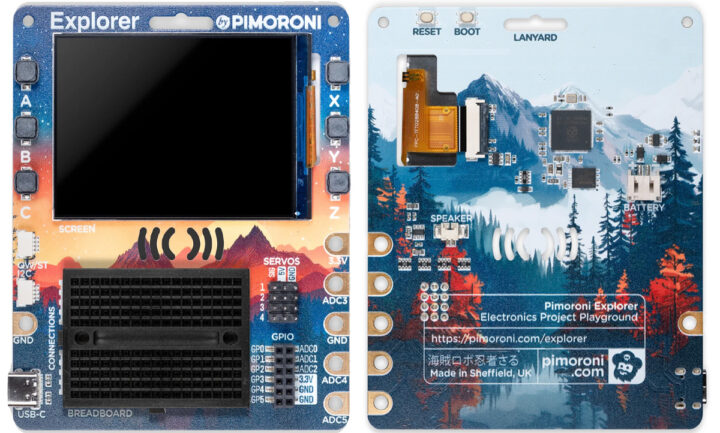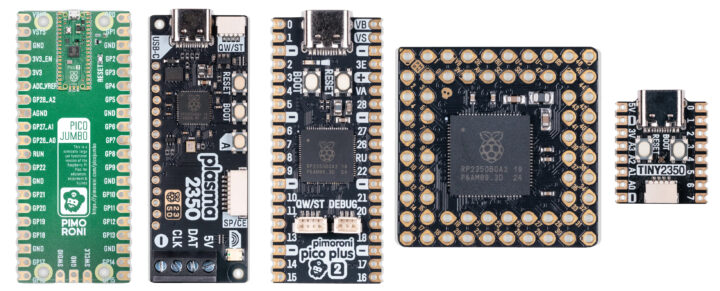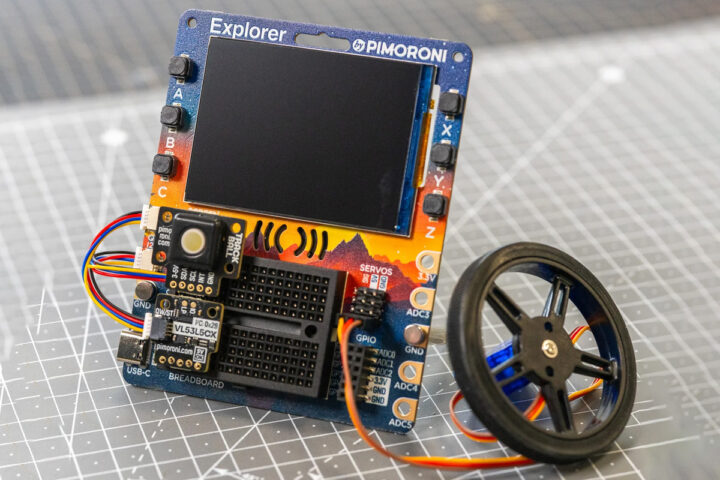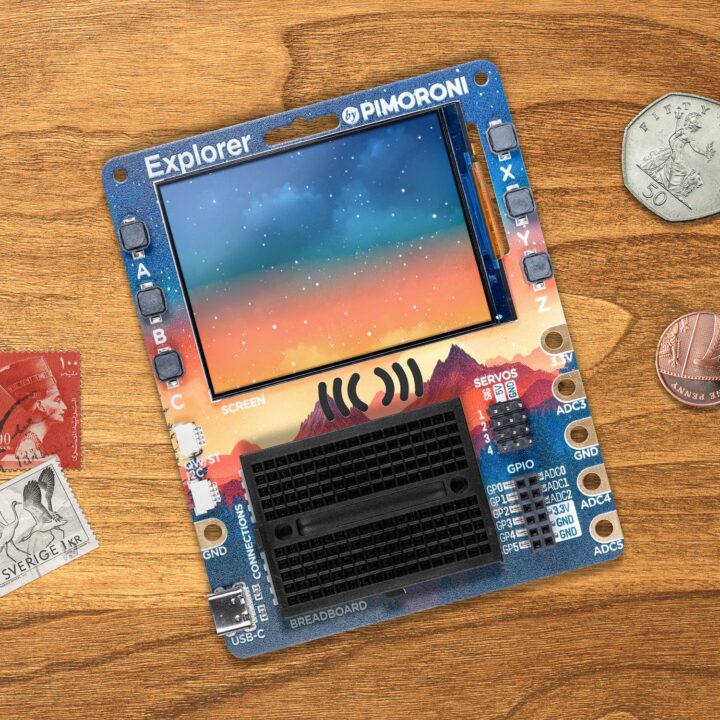The Pimoroni Explorer board is an electronic prototyping board built around the Raspberry Pi RP2350 chip with a 2.8-inch LCD screen, a speaker connector, and various I/Os, which makes it easy to build circuits, prototype projects, and even make small robots. It also features a mini breadboard, tactile buttons, and crocodile clip terminals, making it suitable for both beginners and experienced makers.
The RP2350 MCU was recently released by Raspberry Pi Limited along with the $5 Raspberry Pi Pico 2 board. Since that initial release, we have seen many RP2350-based development boards like the Cytron MOTION 2350 Pro, the Bus Pirate 5XL and 6, and many other development boards released, feel free to check those out if you are looking for development boards built around the RP2350 MCU.
Pimoroni Explorer board specifications
- Microcontroller – Raspberry Pi RP2350B MCU
- CPU
- Dual-core Arm Cortex-M33 @150MHz with Arm Trustzone for secure boot
- Dual-core 32-bit Hazard3 RISC-V @ 150MHz
- Up to two cores can be used at the same time
- Memory – 520 KB on-chip SRAM in 10 banks
- 8kB OTP storage
- Security features
- 8KB of anti-fuse OTP for key storage
- Secure boot (Arm only)
- SHA-256 acceleration
- Hardware TRNG
- CPU
- Storage – 16MB QSPI flash
- Display – 2.8″ IPS LCD screen (320 x 240 pixels), ST7789V driver, 250 cd/m² luminance, 43.2 x 57.5mm active area
- USB – USB Type-C connector for primary power and programming
- Audio – Header for piezo speaker
- Buttons
- 6x user controllable push buttons switch
- Reset and boot buttons (on the back side)
- Expansion
- Mini breadboard
- 6x crocodile clip terminals
- 4x 3-pin servo outputs
- 6x GPIO
- 4x ADC
- 2x Qw/ST (Qwiic/STEMMA QT) connector
- Power Supply
- 5V input via Type-C USB
- 2-pin JST-PH battery connector
- Dimensions – 107 x 85 x 16mm (H x W x D, assembled)

The company mentions that the board is designed for projects like building circuits, experimenting with electronics, and prototyping robots. Additionally, you can program this board with C/C++ or MicroPython like other RP2350 boards. For more information about the breakout board along with the supported C++/MicroPython build, you can check out their GitHub repository, but at the time of writing the documentation is limited or even inexistant for the board.
The Pimoroni Explorer can be preordered through Pimoroni’s official shop page for £33.90 or around $44. The company also sells a starter kit sold for £60 or around $75 that includes the Pimoroni Explorer board, along with a Pimoroni Super Sensor Suite for environmental, light, and movement sensing, plus a hand-picked assortment of components like LEDs, potentiometers, switches, servos, and wheels, plus jumper wires and other cables to connect everything together.
The company also has released a few more Raspberry Pi RP2350-based development boards and modules including the Pico Jumbo, the Plasma 2350, the Pimoroni Pico Plus 2, the PGA2350, and the Tiny 2350 which you’ll all find on the Pimoroni’s shop.

Debashis Das is a technical content writer and embedded engineer with over five years of experience in the industry. With expertise in Embedded C, PCB Design, and SEO optimization, he effectively blends difficult technical topics with clear communication
Support CNX Software! Donate via cryptocurrencies, become a Patron on Patreon, or purchase goods on Amazon or Aliexpress






